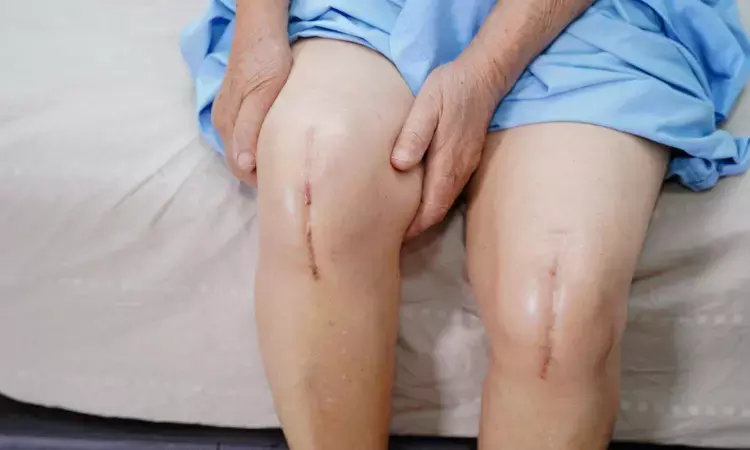- Home
- Medical news & Guidelines
- Anesthesiology
- Cardiology and CTVS
- Critical Care
- Dentistry
- Dermatology
- Diabetes and Endocrinology
- ENT
- Gastroenterology
- Medicine
- Nephrology
- Neurology
- Obstretics-Gynaecology
- Oncology
- Ophthalmology
- Orthopaedics
- Pediatrics-Neonatology
- Psychiatry
- Pulmonology
- Radiology
- Surgery
- Urology
- Laboratory Medicine
- Diet
- Nursing
- Paramedical
- Physiotherapy
- Health news
- Fact Check
- Bone Health Fact Check
- Brain Health Fact Check
- Cancer Related Fact Check
- Child Care Fact Check
- Dental and oral health fact check
- Diabetes and metabolic health fact check
- Diet and Nutrition Fact Check
- Eye and ENT Care Fact Check
- Fitness fact check
- Gut health fact check
- Heart health fact check
- Kidney health fact check
- Medical education fact check
- Men's health fact check
- Respiratory fact check
- Skin and hair care fact check
- Vaccine and Immunization fact check
- Women's health fact check
- AYUSH
- State News
- Andaman and Nicobar Islands
- Andhra Pradesh
- Arunachal Pradesh
- Assam
- Bihar
- Chandigarh
- Chattisgarh
- Dadra and Nagar Haveli
- Daman and Diu
- Delhi
- Goa
- Gujarat
- Haryana
- Himachal Pradesh
- Jammu & Kashmir
- Jharkhand
- Karnataka
- Kerala
- Ladakh
- Lakshadweep
- Madhya Pradesh
- Maharashtra
- Manipur
- Meghalaya
- Mizoram
- Nagaland
- Odisha
- Puducherry
- Punjab
- Rajasthan
- Sikkim
- Tamil Nadu
- Telangana
- Tripura
- Uttar Pradesh
- Uttrakhand
- West Bengal
- Medical Education
- Industry
Flavonoid supplement Diosmin reduces lower-extremity swelling and pain after total knee arthroplasty: Study

China: Diosmin use after total knee arthroplasty (TKA) reduces lower-extremity swelling and pain during motion and is not tied to an increased risk of short-term complications, a recent study published in The Journal of Bone & Joint Surgery has shown. Diosmin is a flavonoid supplement derived from citrus fruits.
"For patients undergoing total knee arthroplasty, treatment with diosmin reduced swelling of the knee and leg and some measures of associated pain can be achieved, reports the clinical trial by Pengde Kang, PhD, MD, of Sichuan University, Chengdu, China, and colleagues.
Possible new approach to alleviate painful swelling after TKA
Swelling is a common problem in patients undergoing TKA, and one that contributes to pain and patient dissatisfaction. "Postoperative lower-extremity swelling is a major hindrance to the enhanced recovery of patients undergoing TKA," the researchers write. Various measures have been proposed to decrease swelling, including rest, cold packs, and compressive bandages, with mixed success. Currently, there are no effective medication choices to reduce swelling after TKA.
Diosmin – often in combination with a related flavonoid called hesperidin – has been used to reduce swelling of the limbs in patients with venous disorders. Although diosmin is not approved as a prescription medication in the United States or Europe, experience suggests that it is well tolerated with low toxicity. Based on these characteristics, the researchers designed a clinical trial to evaluate the effectiveness and safety of diosmin in patients undergoing TKA.
The exploratory study included 330 patients undergoing TKA at 13 university-affiliated hospitals. Patients were randomly assigned to either a treatment group, receiving a 14-day course of diosmin starting postoperative day 1; or to a control group, receiving no study treatment. Both groups received standard pain medications.
Swelling at specific locations was measured at 1, 2, 3, and 14 days postoperatively and compared between the diosmin and control groups. Pain scores, knee function, complication rates, and blood levels of certain inflammatory markers (C-reactive protein and interleukin-6) were also assessed.
Diosmin reduces swelling and pain scores with movement
The results showed reduced swelling at the knee, calf, and thigh up to 14 days after TKA in patients assigned to diosmin. The reduction in swelling was associated with lower pain scores on knee movement. In contrast, pain scores at rest were not significantly different for the diosmin versus control groups. Assessments of knee function recovery and levels of inflammatory biomarkers were similar as well.
Short-term complication rates were also similar between groups, supporting the safety of diosmin. Thsere was a trend toward decreased rates of postoperative nausea and vomiting with diosmin, although the difference was not significant.
The study provides preliminary evidence that diosmin is a safe and effective treatment to reduce swelling and pain with movement after TKA. However, questions remain as to how diosmin exerts these effects – particularly since the study finds no change in inflammatory biomarker levels between groups.
"This negative result may reflect the efficacy of the other anti-inflammatory drugs that were administered to both groups," Dr. Kang and colleagues write. They emphasize the need for further studies to assess the mechanism by which diosmin reduces swelling, and whether some alternative dosing regimen might be more effective.
Reference:
Wang, Qiuru ,Jin, Qunhua ; Cai, Lijun , Zhao, Chengcheng Feng, Pengfei Efficacy of Diosmin in Reducing Lower-Extremity Swelling and Pain After Total Knee Arthroplasty: A Randomized, Controlled Multicenter Trial. The Journal of Bone and Joint Surgery ():10.2106/JBJS.23.00854, December 18, 2023. | DOI: 10.2106/JBJS.23.00854.
Dr Kamal Kant Kohli-MBBS, DTCD- a chest specialist with more than 30 years of practice and a flair for writing clinical articles, Dr Kamal Kant Kohli joined Medical Dialogues as a Chief Editor of Medical News. Besides writing articles, as an editor, he proofreads and verifies all the medical content published on Medical Dialogues including those coming from journals, studies,medical conferences,guidelines etc. Email: drkohli@medicaldialogues.in. Contact no. 011-43720751


